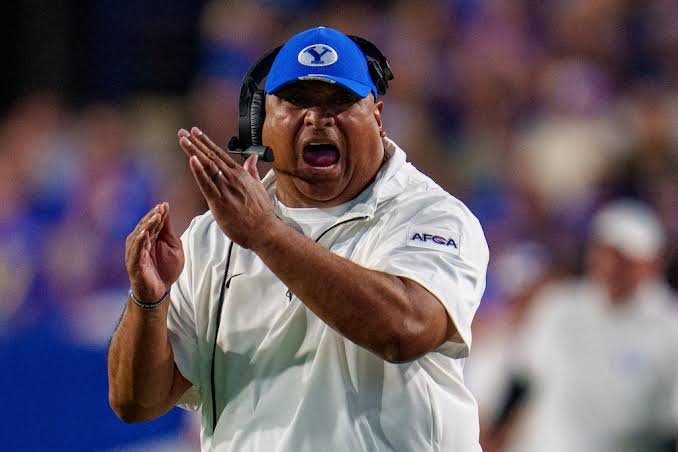The BYU Cougars head coach is finding himself at the center of mounting pressure following back-to-back disappointing seasons, a stretch that has tested both his leadership and the patience of the fanbase. The team’s transition into the SEC—a move meant to boost the program’s profile—has instead highlighted weaknesses on both sides of the ball, with inconsistent play, missed opportunities, and costly mistakes defining their conference debut. While there was optimism surrounding the program’s potential to make an immediate impact, the results have fallen short of expectations, fueling concerns about the long-term direction of the team.

Adding to the complexity of the situation is the lucrative six-year, $51 million contract extension the coach signed prior to these struggles. At the time, the deal was seen as a commitment to stability and a belief in his vision for the Cougars’ future. However, the hefty financial commitment now looms large in discussions among critics who argue that the return on investment has been underwhelming. In the cutthroat SEC environment, where results often dictate job security, such a contract can quickly shift from a symbol of faith to a lightning rod for criticism.
In an effort to address the program’s trajectory, the coach brought in former NFL executive Jim Nagy to help revamp recruiting, scouting, and overall player development. The hire was widely praised at first, seen as a bold move to align the Cougars’ talent acquisition with professional-level evaluation standards. However, early returns on the Nagy partnership have yet to materialize in the form of on-field wins, leaving many to wonder whether the adjustments are coming too slowly to compete with SEC heavyweights.

The challenge for BYU is multifaceted. They are trying to adapt to the physicality and speed of the SEC while maintaining their own identity—a balance that has proven elusive. The offense has shown flashes of potential, but too often stalls against top-tier defenses. Meanwhile, defensive struggles have been exposed by the conference’s elite quarterbacks and high-powered schemes. Without a clear turnaround in performance, the perception that the program is in over its head will only grow.
Off the field, fan sentiment is shifting. While BYU’s supporters are known for their loyalty, the patience that once defined their relationship with the head coach is beginning to wear thin. Calls for accountability have become more vocal, and each game is now viewed as a referendum on whether the current leadership can truly elevate the program. Boosters and alumni—key voices in the program’s ecosystem—are also paying close attention, with some reportedly questioning whether changes may be needed sooner rather than later.

The remainder of the season will be pivotal. A strong finish could restore confidence and quiet calls for drastic change, while continued struggles will only intensify the scrutiny and speculation about the coach’s future. In the unforgiving SEC, there is little margin for error, and BYU’s head coach knows that turning the tide quickly is not just about saving the season—it may be about saving his tenure altogether.
